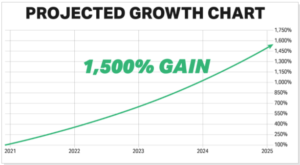Is now the time to bet big on Bitcoin? Find out what an experienced pro thinks.
Leading cryptocurrency Bitcoin (BTC -3.78%) should more than double its price from $68,000 to $150,000 before the end of the year. That's the view of hedge fund manager Mark Yusko, founder and manager of the Morgan Creek Digital firm. Yusko also expects the “digital gold” crypto to grow tenfold over the next decade.
Yusko's bullish forecast raises a few burning questions:
- Does his $150,000 forecast make sense?
- How about the implied $680,000 goal for 2034?
- Why should we listen to Mark Yusko's Bitcoin opinions, anyway?
So let's see what's up with Mark Yusko and his bold Bitcoin predictions.
Why should crypto investors listen to Mark Yusko?
First things first: Why should investors pay attention to Mark Yusko's cryptocurrency analysis?
After more than a decade of managing endowment funds at Notre Dame and the University of North Carolina, Yusko left the world of academic endowments to found Morgan Creek Capital Management in 2004. He kicked off the Morgan Creek Digital subsidiary in 2018, focusing on new technology ideas such as blockchain coins, big data, and artificial intelligence.
Yusko has a longer history of hands-on cryptocurrency management than most of his mates from the traditional finance world. The Morgan Creek-Exos Risk-Managed Bitcoin Fund project has been available since November 2020, giving institutional investors access to a Bitcoin instrument with fund managers seeking to reduce the risk of owning Bitcoin directly. The fund's track record isn't perfect, but the mere act of having skin in the Bitcoin game for nearly a decade gives Yusko plenty of street cred.
Halving the digital cake and eating it too
Here's what this crypto management veteran said in a CNBC interview last week. First, he said that “it's just math,” pointing out the price-boosting effects of each halving event. Bitcoin will soon reduce the number of tokens awarded to miners for processing transactions and adding security to the blockchain network. This is a hard-coded thing that happens roughly once every four years, with the next halving scheduled near the end of next week.
“Then you start to get an increase in demand from ETFs and other people interested,” he said. “But the supply of new coins goes from 900 to 450. Well, think about it — if there's more demand than supply, the price has to rise.”
The price increase tends to start slowly and accelerate later on, reaching a fresh peak roughly 9 months later, Yusko explained. And Bitcoin's price gains tend to lift the crypto market as a whole.
“Bitcoin is the king,” Yusko said. “It is the dominant token. It is a better form of gold or digital property.”
In the long run, the law of large numbers should kick in. Winners keep winning and the standards-setting cryptocurrency seems poised to continue its long-term rise.
“I think it can go up 10x from here, easily, over the next decade,” Yusko said. Some smaller crypto projects should skyrocket “orders of magnitude more,” but then you're trying to find winners among a large batch of largely unproven ideas. Therefore, Bitcoin is the safest bet on sustained crypto value in the long run, according to Mark Yusko.
Bitcoin's next bull run
Yusko's reasoning makes sense. Growth investing phenom Cathie Wood would probably nod along to Mark Yusko's explanation, since she also expects a large Bitcoin price gain after the upcoming halving.
I'm not so sure about Yusko's accelerated timeline. The price rush sparked by earlier halving events tends to start eight or nine months later, with the pricing peak following a few months after that. Based on historical moves, I'd expect the next crypto winter to start around the summer of 2025.
Yusko's near-term price target looks about right, but there are many brand-new variables to consider this time. The regulatory system for crypto ownership is evolving, driven by several high-profile legal challenges and the ramifications of crypto scams like the rickety FTX exchange. There are Bitcoin-based exchange-traded funds (ETFs) on the market now, moving hundreds of billions of Bitcoin value into the hands of old-school investor types. These uncharted waters may raise or lower the price target bar for Bitcoin in the 2024-2025 bull cycle. But again, $150,000 per digital coin sounds about right, with a very large margin of error on both sides.
Is Bitcoin going to the moon in the long run?
The same analysis applies to Yusko's long-term projection, too. There are too many unpredictable variables on the table to pin a specific price target on the Bitcoin of 2034, but the price chart should slope upward for years to come.
At the heart of it, Bitcoin is just a better way to track transactions with the transparency of a globally available ledger, wrapped in several layers of security-boosting encryption features. It enables digital banking and decentralized finance applications, giving people more control over their finances with fewer middlemen making a profit on every transaction.
I don't know about you, but that sounds like a healthy and nearly unstoppable financial revolution to me. And I agree with Yusko when he says that Bitcoin is the king of the digital castle.
Will Bitcoin's price jump tenfold in a decade? I wouldn't be surprised, given its hundredfold increase over the past 10 years and the positive variables mentioned above. But I wouldn't bet the farm on that target, either. Ultra-bulls like Mark Yusko and Michael Saylor can argue that converting all your cash into Bitcoin is a good idea, but you know what they say about the best ideas of mice and men. Including a modest slice of Bitcoin in your diversified investing portfolio is a much safer option, just in case a new blockchain network steals Bitcoin's throne or quantum computers break the digital security of blockchain networks.
So I generally agree with Mark Yusko's analysis, though I'd hesitate to nail down exact dollar targets for any specific moment in time. I'll just hold on to my fraction of a Bitcoin (and a handful of other investments in the cryptocurrency arena) and take whatever gains this diverse basket of digital assets may earn in the long haul.
And you should consider a similar approach.











